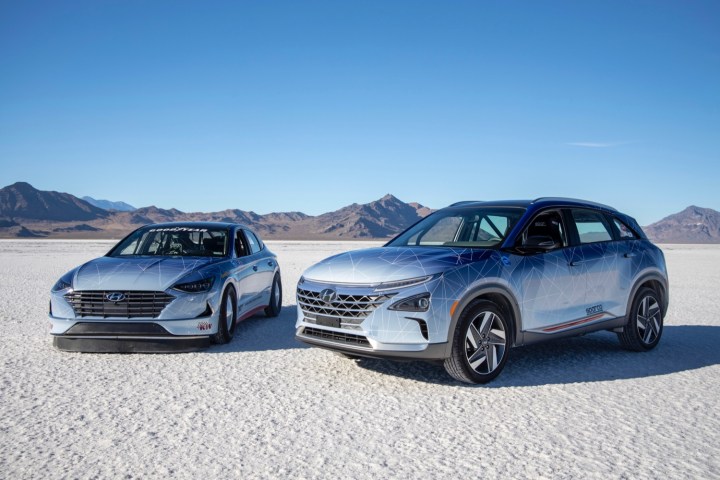
Utah’s Bonneville Salt Flats are a temple of speed. You can show up with any type of car and set a land speed record, which is exactly what Hyundai did with two very unlikely vehicles. The Hyundai Nexo hydrogen fuel cell SUV and Sonata Hybrid sedan aren’t very sporty in stock form, but each just set a record at Bonneville in its respective category.
The Nexo reached 106.160 mph on the salt, which Hyundai claims is a record for a fuel cell vehicle. The record breaking car was mostly stock, with modifications made primarily for safety. Hyundai fitted a roll cage, fire suppression system, and a Sparco seat with six-point harness. An “under-bumper aero valance” was also added to improve aerodynamics, according to Hyundai.
Based on redesigned 2020 Sonata, the Sonata Hybrid land speed record car hit 164.669 mph at Bonneville, enough for a record in the car’s class, according to Hyundai. The hybrid sedan received more extensive modifications than the Nexo. Its engine was tuned to run on racing fuel, and fitted with a custom exhaust header and nitrous oxide system. The suspension and tires were land-speed specific, and the car was fitted with smooth Moon Disc wheel covers — a staple at Bonneville. Like the Nexo, the Sonata was also fitted with a roll cage, six-point harness, and fire suppression system.
This isn’t the first time Hyundai has brought green cars to Bonneville. In 2016, a Hyundai Ioniq Hybrid hit 157.825 mph on the salt, setting a record for production-based hybrids that the Sonata Hybrid has presumably broken. Hyundai has also developed a battery-electric version of its Veloster hatchback for circuit racing.
The Nexo and Sonata Hybrid land speed record cars will be on display at the 2019 SEMA show in Las Vegas. Hyundai will also bring an off-road version of the Veloster to SEMA, the automotive aftermarket industry’s biggest trade show. The Nexo is currently on sale in California only, since that’s the only state with enough hydrogen stations. Expect the redesigned Sonata Hybrid to launch in the United States in the coming months alongside the gasoline 2020 Sonata, which will get some new fuel-saving tech of its own in the form of a continuously variable valve duration engine, which Hyundai claims will boost efficiency.


